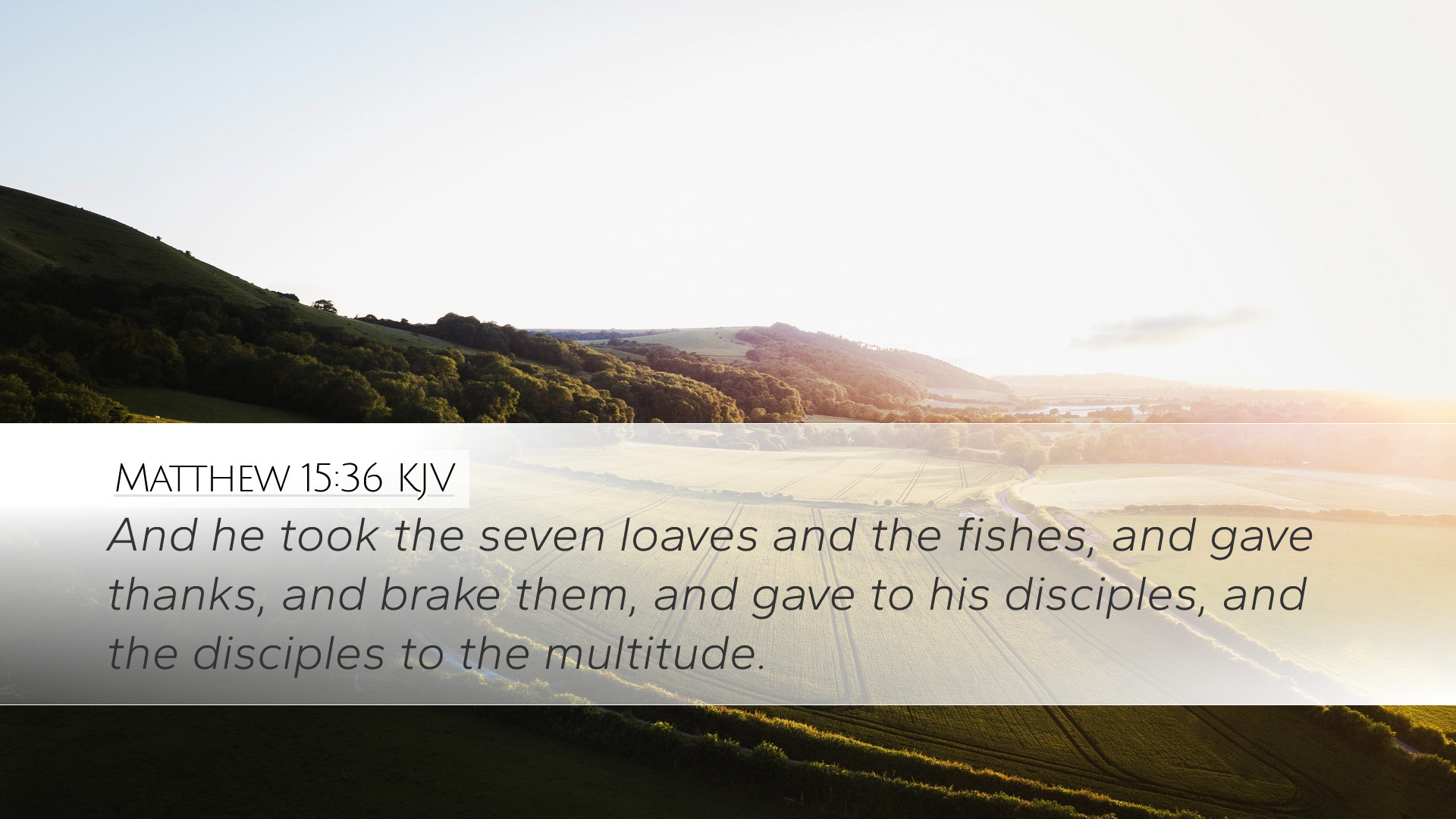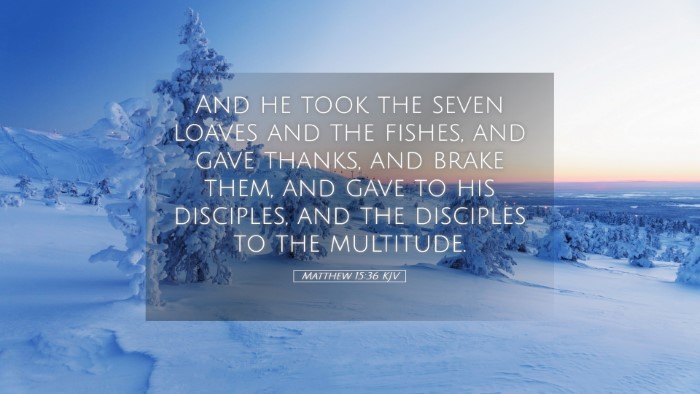Commentary on Matthew 15:36
Matthew 15:36 states: "And He took the seven loaves and the fishes, and gave thanks, and brake them, and gave to His disciples, and the disciples to the multitude." This verse is pivotal in understanding the ministry of Jesus and His miraculous provisions.
Introduction to the Context
This passage occurs during a significant moment in Christ's ministry. Shortly before this miracle, Jesus had withdrawn to a region near Tyre and Sidon, where He healed the daughter of a Canaanite woman and subsequently returned to the Sea of Galilee. The crowd that gathered had great needs, and Christ's compassion moved Him to provide for them both spiritually and physically.
Breaking Down the Verse
- He took the seven loaves and the fishes: This action signifies the Lord's recognition of what little resources the people had. His choice to use the seven loaves and few fishes demonstrates God's capacity to use small means to achieve great ends.
- Gave thanks: Jesus’ act of giving thanks prior to the miracle is significant. It emphasizes a profound principle of gratitude, reflecting His dependence on the Father. This reminds believers to acknowledge God and His providence, even in times of scarcity.
- And brake them: The breaking of bread is a foreshadowing of the Last Supper, symbolizing sacrifice and the act of sharing. It reminds us of the necessity of breaking oneself for the sake of others, an act Jesus embodies throughout His ministry.
- Disciples and the multitude: The distribution by the disciples conveys a vital aspect of ministry. Jesus equips His followers to serve others, calling them to participate in His miracles, which speaks to the collaborative nature of Christian ministry.
Commentaries from Matthew Henry
Matthew Henry highlights the significance of this miracle within the broader context of Christ's compassion. He notes that Jesus' act of giving thanks indicates His awareness of the Father’s supply. Henry elaborates that the act of breaking bread should serve as a model for believers, encouraging them to continually give thanks for God's provisions.
He also emphasizes that this miracle illustrates the abundance of Christ's grace. Just as He multiplied the loaves and fishes, so shall He multiply the grace and blessings in the lives of those who trust Him.
Insights from Albert Barnes
Albert Barnes expounds on the miraculous nature of the feeding of the multitude, highlighting the faith aspect of the experience. He suggests that the miracle was also a test of faith for both the disciples and the crowd. Barnes argues that this miracle reveals Christ’s power to provide for every need, spiritual and physical.
Furthermore, he points out that the disciples' participation in the distribution of food symbolizes the responsibility of the church to share the Gospel and physical provisions with the world.
Adam Clarke’s Perspective
Adam Clarke offers a detailed analysis of the numbers reported in the feeding miracle — seven loaves and a few small fish. He elucidates the symbolism of numbers in Scripture, suggesting that seven often denotes completeness and divine perfection. Clarke interprets the miracle as a demonstration of divine sufficiency, where God meets all needs in a complete and perfect manner.
Clarke also emphasizes the need for orderly distribution among the multitude, recognizing the role of the disciples in this organization, which mirrors the church’s role in administering God’s grace to the world.
Theological Implications
This verse, rich in meaning, provides significant theological implications for the church today. It frames the understanding of Jesus as not only a miracle worker but also a provider who engages His followers in ministry. The act of giving thanks highlights a Christ-centered approach to life and ministry, where gratitude precedes abundance.
The need for the church to recognize its role in serving and providing, much like the disciples, is paramount. Believers are called to bring what they have to Jesus, who can multiply those resources for His glory and the good of others.
Practical Applications for Ministry
- Gratitude in Ministry: Encourage a culture of thankfulness in congregational life, recognizing God’s continuous provision and fostering a spirit of generosity.
- Empowering Discipleship: Equip believers to take part in acts of service and compassion, much like the disciples were involved in the feeding of the multitude.
- Faith in Action: Challenge the church community to step out in faith with limited resources, trusting in God’s power to multiply efforts for His kingdom.
- Community Engagement: Foster initiatives that mirror Jesus’ compassion, addressing the physical and spiritual needs of the local community.
Conclusion
Matthew 15:36 serves as a profound reminder of Jesus’ care and provision. The insights drawn from public domain commentaries illustrate the depth of this miracle and encourage a deeper understanding of how Christ works through His followers. As pastors, students, theologians, and scholars reflect on this verse, may it inspire a greater commitment to faith, gratitude, and service in their ministries.


